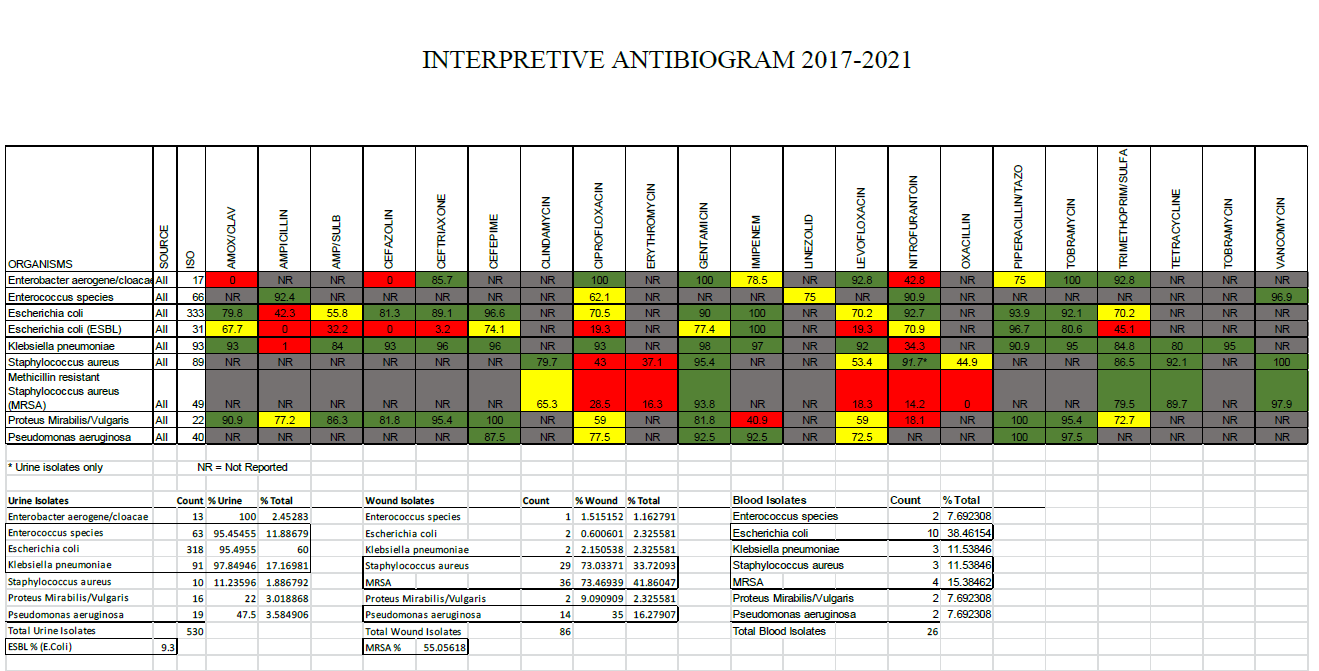Pharmacy
Pharmacy Department
The Pharmacy department aims to achieve the highest quality medication related care to all patients treated at MCMH. This is driven by careful oversight of all medication related processes within the hospital. This includes verifying that each medication order is accurate, appropriate, and safe for the patient.
The pharmacy department also provides services such as therapeutic drug monitoring and pharmacy consultation. In particular, it provides pharmacy expertise in the safe and effective use of high risk medications. Additionally, the pharmacy provides direct oversight of the medication order entry process, clinical pharmacy support, risk management, and quality improvement projects such as the antimicrobial stewardship program.
What is an antimicrobial stewardship program?
An Antimicrobial Stewardship program (ASP) is designed to improve the appropriate use of antimicrobial agents which include but are not limited to antibiotics. ASPs create targeted interventions that allow healthcare professionals such as Pharmacists the opportunity to engage with prescribing practitioners about the appropriate use of medications when treating infection. Appropriate use can be defined simply as using the right medication at the right time for the right amount of time.
What type of data is collected by the antimicrobial stewardship program?
The ASP program at MCMH tracks the use of certain types of antibiotics known to be at higher risk for the development of C. Difficile. The program also creates an annual report known as the antibiogram which displays community resistance rates for common antimicrobials. The antibiogram helps inform the ASP team and prescribing practitioners about antimicrobial resistance rates so that intervention can be made to help reduce rising resistance. This is also important at the time of care when prescribing antimicrobials because the sensitivity of a pathogen to certain antimicrobials in unknown. When a prescribing healthcare professional is aware of the community resistance patterns then the patient has a better chance of receiving a prescription for an antimicrobial that will actually treat their infection.
Why is it important to have an antimicrobial stewardship program?
In the absence of ASPs, inappropriate use of antimicrobials can have both short term and long term negative consequences. In the short term the patient may experience a worsening of infection if the wrong antimicrobial is selected or perhaps have a relapse of infection if the treatment course is insufficient. When antibiotics are taken for long periods of time patients may develop a severe secondary bacterial infection called pseudomembranous colitis caused by a bacterium named C. Difficile also known as “C.Diff”.
In the long term, inappropriate use can lead to a rise in antimicrobial resistance and multi-drug resistance organisms. Antimicrobial resistance is the acquired ability for a pathogen such as bacteria to become immune to the effects of certain antimicrobials when they are prescribed frequently. This eventually leaves the patient and physician with fewer options to treat infection. Infections caused by these antimicrobial resistant pathogens often have periods of treatment failure and symptom worsening until further testing is done to uncover which antimicrobial will work. The term multi-drug resistance organism refers to a pathogen with resistance to many different types of antimicrobials. In many instances, these patients may require hospitalization in order to receive antimicrobials that can only be given intravenously to treat the multi-drug resistant organism. One way ASP programs work to reduce the frequency of antimicrobial use is by educating prescribing practitioners on the avoidance of antimicrobials when they are unnecessary or may lead to minimal benefit to the patient.
-
 Flassorvia Joseph, PharmD, CPh Director of Pharmacy
Flassorvia Joseph, PharmD, CPh Director of PharmacyContact:
850-253-1952
Biographical Sketch
Flassorvia Joseph, Pharmacist
Flassorvia is a 2020 graduate of FAMU and has spent the last year working as a retail pharmacist in Orlando. During the pandemic she recognized that she felt drawn to serve more in a hospital setting and she is so excited to begin her hospital journey here with us. She is passionate about research and learning and taking that information back to teach her colleagues, patients and families.

